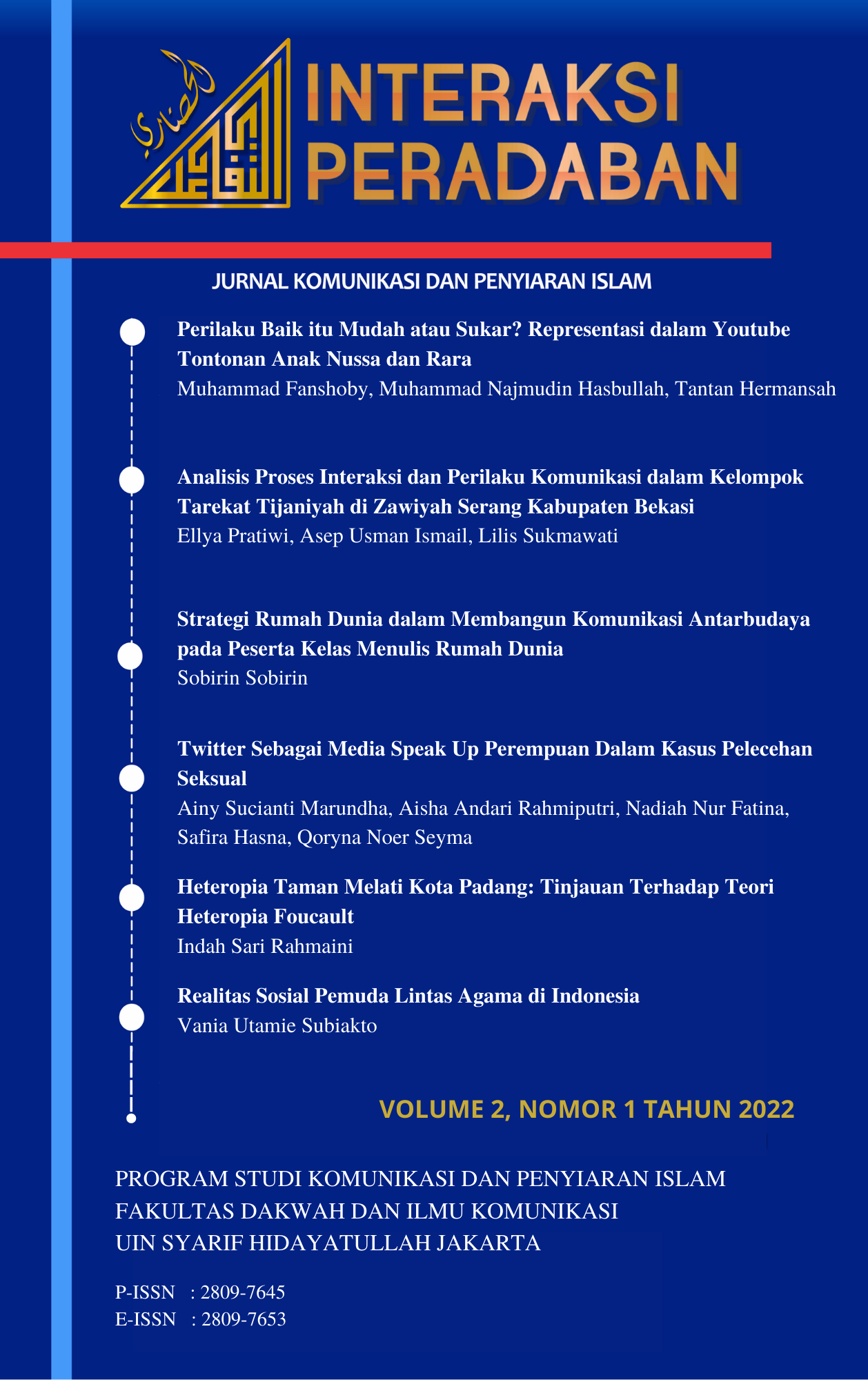Twitter Sebagai Media Speak Up Perempuan Dalam Kasus Pelecehan Seksual
DOI:
https://doi.org/10.15408/interaksi.v2i1.26616Keywords:
Sexual Harassment, Cyberfeminism, Social Media, WomenAbstract
Sexual harassment is not something that has just been heard or recently talked about. Sexual harassment is still a threat and taboo to be discussed and is not an easy thing to get rid of. This often happens to women in Indonesia, both in public places and on social media. However, along with the presence of social media, women can take advantage of the forum as a place where they express their opinions to voice issues of empowering women. Therefore, the objective of this research is to find out women victims of sexual harassment in utilizing social media Twitter as a forum for expression related to sexual harassment cases. This research used theory of feminism, cyberfeminism, sexual harassment and the relation between technology and women. This research used qualitative approach and constructivism strategy. The data was collected through in-depth interview with female victims of sexual harassment who dare to speak up on Twitter social media.
References
Adam, Aulia. (2018). Melawan Budaya Perkosaan bersama Gitasav dan Via Vallen - Sosial Budaya Tirto.id. Retrieved March 31, 2019, from https://tirto.id/melawan-budaya-perkosaan-bersama-gitasav-dan-via-vallen-cL5o
Anderson, G. L. and Barrera, I. (1995) ‘Critical Constructivist Research and Special Education’, Remedial and Special Education, 16(3), pp. 142–149. doi: 10.1177/074193259501600303.
Armstrong, C. L. and Mahone, J. (2017) ‘“It’s On Us.” The Role of Social Media and Rape Culture in Individual Willingness to Mobilize Against Sexual Assault’, Mass Communication and Society. Routledge, 20(1), pp. 92–115. doi: 10.1080/15205436.2016.1185127.
Artaria, M. D. (2012) ‘Efek Pelecehan Seksual di Lingkungan Kampus: Studi Preliminer’, BioKultur, 1(1), pp. 53–72. Available at: http://journal.unair.ac.id/BK@efek-pelecehan-seksual-di-lingkungan-kampus-article-4373-media-133-category-.html.
BBC News Indonesia. (2018). Kasus Via Vallen terima 'pesan mesum', Komnas Perempuan sebut ia korban pelecehan seksual di dunia maya. https://www.bbc.com/indonesia/trensosial-44367891
Bowley, R. C. (2009) A COMPARATIVE CASE STUDY: EXAMINING THE ORGANIZATIONAL USE OF SOCIAL NETWORKING SITES. The University of Waikato.
Consalvo, M. (2012) ‘Cyberfeminism : Encyclopedia of New Media’, Encyclopedia of New Media. Available at: https://study.sagepub.com/sites/default/files/Ch17_Cyberfeminism.pdf
Daniels, J. (2009) ‘Rethinking Cyberfeminism(s): Race, Gender and embodiment.’, Women’s Studies Quarterly`, 37(1), pp. 101–124.
Davis, S. E. (2018) ‘Objectification, Sexualization, and Misrepresentation: Social Media and the College Experience’, Social Media and Society, 4(3). doi: 10.1177/2056305118786727.
Dhani, A. (2017). Mereka yang Dilecehkan dan Mencoba Melawan - Tirto.ID. Retrieved February 23, 2019, from https://tirto.id/mereka-yang-dilecehkan-dan-mencoba-melawan-b9Vi
Elsherief, M. and Belding, E. (2015) ‘The urban characteristics of street harassment: A first look’, Proceedings of the 1st International ACM SIGSPATIAL Workshop on Smart Cities and Urban Analytics, UrbanGIS 2015, pp. 28–31. doi: 10.1145/2835022.2835027.
Fiss, O. M. (1994) ‘What is Feminism Anyway?’, Faculty Scholarship Series. Available at: https://digitalcommons.law.yale.edu/fss_papers/1331?utm_source=digitalcommons.law.yale.edu%2Ffss_papers%2F1331&utm_medium=PDF&utm_campaign=PDFCoverPages.
Gajjala, R. (1999) ‘Internet Constructs of Identity and Ignorance: “Third-world” Contexts and Cyberfeminism’, Works and Days, 33/34(17 & 18), pp. 118–137.
Hains, R. C. (2009) ‘Power Feminism, Mediated: Girl Power and the Commercial Politics of Change’, Women’s Studies in Communication, 32(1), pp. 89–113. doi: 10.1080/07491409.2009.10162382.
Harvey, K. (2014) ‘Social Media, Definition and Classes of’, Encyclopedia of Social Media and Politics. doi: https://doi.org/10.4135/9781452244723.n485.
Kaplan, A. M. and Haenlein, M. (2010) ‘Users of the world, unite! The challenges and opportunities of Social Media’, Business Horizons, 53(1), pp. 59–68. doi: 10.1016/j.bushor.2009.09.003.
Lottridge, D. and Bentley, F. R. (2018) ‘Let’s hate together: How people share news in messaging, social, and public networks’, Conference on Human Factors in Computing Systems - Proceedings, 2018-April, pp. 1–13. doi: 10.1145/3173574.3173634.
Moi, T. (1997) ‘Feminist, Female, Feminine’, in The Feminist Reader. New York: Basil Blackwell, pp. 104–116. doi: 10.1007/978-1-349-25621-1_9.
Mulyawan, I. W. (2010) Hipersemiotika Periklanan (Analisis Praktis). Bali: Udayana University Press.
Neimeyer, R. and Levitt, H. (2001) ‘Constructivism / constructivist methodology’, International Encyclopedia of the Social and Behavioral Sciences, (March).
Popa, D. and Gavriliu, D. (2015) ‘Gender Representations and Digital Media’, Procedia - Social and Behavioral Sciences. Elsevier B.V., 180(November 2014), pp. 1199–1206. doi: 10.1016/j.sbspro.2015.02.244.
Riantrisnanto, Ruly. (2018). Via Vallen Mengaku Dilecehkan Oknum Pesepak Bola Terkenal - ShowBiz Liputan6.com. Retrieved March 24, 2019, from https://www.liputan6.com/showbiz/read/3549716/via-vallen-mengaku-dilecehkan-oknum-pesepak-bola-terkenal
Ruiz, T. (2005) ‘Feminist Theory and International Relations: The Feminist Challenge to Realism and Liberalism’, Soundings Journal, 2(November). Available at: https://www.csustan.edu/sites/default/files/honors/documents/journals/soundings/Ruiz.pdf.
Schmitt, F. E. and Martin, P. Y. (1999) ‘Unobstrusive Mobilization By an Institutionalized Rape Crisis Center “All We Do Comes from Victims”’, Gender and Society, 13(3), pp. 364–384.
Smitley, M. (2004) ‘Women and the Internet : Reflections on Cyberfeminism and a Virtual Public Sphere’, Women’s Studies, (August).
Verma, P. M., Haq, F. and Rai, G. (2018) ‘Social media a tool of cyber feminism activism’, International Journal of Research Culture Society, 2(2), pp. 488–497.










